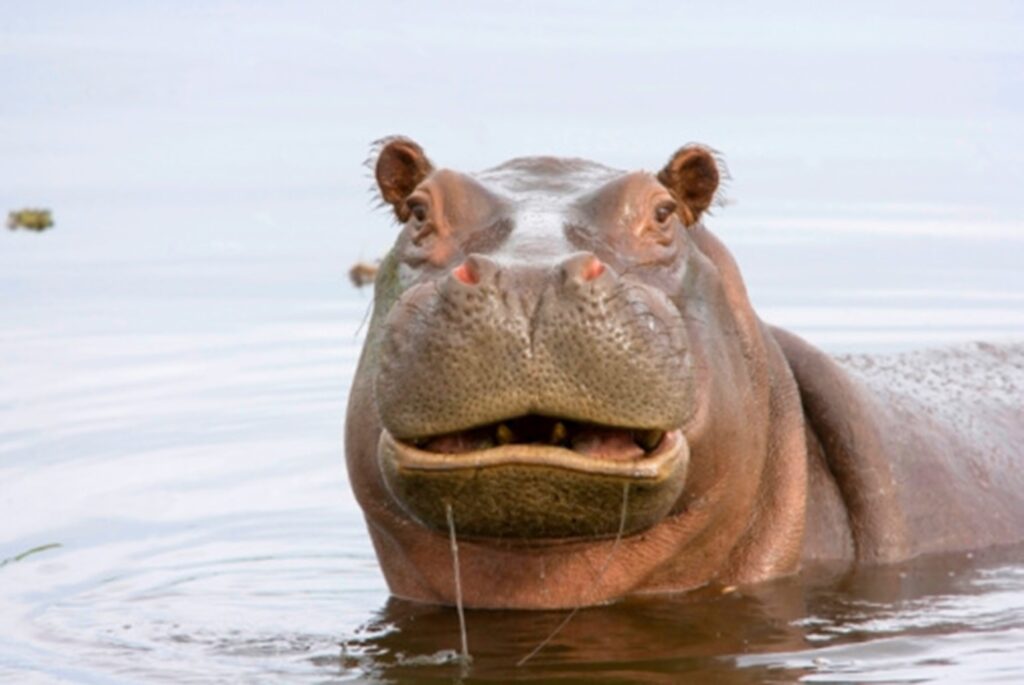
Photo courtesy of unsplash.com
By: Liza Honaker, Staff Writer
The Columbian government is facing an unexpected invasive species problem; hippos.[1] In the 80’s, notorious drug-trafficker Pablo Escobar brought four hippos to his estate in Puerto Triunfo to add to his private zoo.[2] When Escobar died in 1993, his estate became government property and most of his animals were shipped off to surrounding zoos.[3] The hippos, however, were deemed too troublesome to relocate, due to their size, and so they were released into the Magdelena River basin.[4]
Escobar’s hippos are thriving in the Magdelena River and there are now over 100 living in the area.[5] The locals don’t mind, as the hippos generate tourism and protect the river from illegal fishing.[6] However, invasive species always present some danger to native wildlife[7] and hippo waste triggers a type of algae growth that renders water toxic to fish.[8] They can also be extremely dangerous to humans.[9] So far, two attacks have been recorded in Columbia, neither resulting in death.[10] The Magdelena hippos have been reproducing at a rapid rate; scientists project that their population could peak at around two thousand without intervention.[11] There are two options for reducing animal population; euthanasia or sterilization.[12] After the first attack, Columbian officials decided to euthanize the hippos because it is cheaper, less laborious, and produces instant results.[13]
Unlike in the U.S., animals have legal standing in Columbia thanks to a law passed in 2016 classifying them as “sentient beings” that are “subject to special protection against pain and suffering.”[14] The law further clarifies that all Columbian citizens have a duty to protect animals and report instances of animal cruelty.[15] The Magdelena River hippos have filed suit seeking an injunction that would protect them from further killings.[16] One of their lawyers, Luis Domingo Gomez Maldonado, argues that the animals have a protectable interest in staying alive and euthanasia threatens that interest.[17] Working with Animal Balance, Maldonado has presented a sterilization plan in place of euthanasia.[18]
In an Ohio district court, Maldonado subpoenaed, Dr. Elizabeth Berkeley and Dr. Richard Berlinski, megafauna experts who work with Animal Balance, under 28 U.S.C. § 1782.[19] This statute allows for an “interested person” to seek an order from federal court for discovery in support of foreign litigation.[20] The application was approved on October 15, 2021, and the Animal Legal Defense Fund referred to the order as “a critical milestone in the broader animal status fight to recognize that animals have enforceable rights” in the U.S.[21]
While laws exist that establish animals have some legal rights not to be abused, ALDF has worked for years to persuade the U.S. government to grant animals the ability enforce their rights for themselves.[22] Chris Berry, managing attorney for ALDF, explains why: “the ultimate goal is that animals have the standing to enforce their legal rights in court, including the right not to be cruelly abused or tortured or needlessly killed.”[23] Currently, only a human being can file suit on behalf of an animal if they can show that they were also harmed, which renders animal protection laws less enforceable.[24]
Columbia is not the only country that recognizes animals as entities with legal standing.[25] Argentina, Pakistan, and India have all made similar updates.[26] In India, a 2019 court case led the High Court of Punjab and Haryana to adopt a rule that established “all animals in the animal kingdom, including avian and aquatic species, [are] legal entities.”[27] The court reasoned that its justice system should evolve to reflect “scientific discovery, evolving standards of morality, and human experience to not only include all humans, but also nonhumans.”[28]
The Ohio court’s recognition of the hippos as “interested persons” does not, alone, reflect any change in US courts.[29] On its face, it merely allows for discovery of a US citizen by a foreign court even when that court accepts animals as interested people.[30] However, it does open the door to more conversations around animal rights and the importance of adapting our justice system to protect our environment, including the creatures in it.
[1] https://www.npr.org/2021/01/24/960060880/colombia-has-a-hippo-problem-thanks-to-pablo-escobar
[2] Id.
[3] Id.
[4] Id.
[5] Id.
[6] Id.
[7] https://www.nationalgeographic.org/encyclopedia/invasive-species/
[8] https://www.npr.org/2021/01/24/960060880/colombia-has-a-hippo-problem-thanks-to-pablo-escobar
[9] https://www.nationalgeographic.com/animals/article/hippos-flooding-fishing-covid-collide-kenya#:~:text=Every%20year%20across%20Africa%2C%20hippos,aggressive%20if%20they%20sense%20danger
[10] https://www.bbc.com/news/world-latin-america-56011594
[11] https://www.npr.org/2021/01/24/960060880/colombia-has-a-hippo-problem-thanks-to-pablo-escobar
[12] https://www.bbc.com/news/world-latin-america-56011594
[13] Id.
[14] https://www.animallaw.info/statute/colombia-ley-1774-2016
[15] Id.
[16] Id.
[17] https://masslawyersweekly.com/2021/10/29/for-first-time-u-s-court-recognizes-animals-as-legal-persons/
[18] Id.
[19] https://www.lexology.com/library/detail.aspx?g=51f8a24f-330d-48ea-a762-6530f12c78d7
[20] Id.
[21] Id.
[22] https://masslawyersweekly.com/2021/10/29/for-first-time-u-s-court-recognizes-animals-as-legal-persons/
[23] Id.
[24] Id.
[25] https://time.com/6110343/pablo-escobar-cocaine-hippos-people/
[26] Id.
[27] https://www.nonhumanrights.org/blog/punjab-haryana-animal-rights/
[28] Id.
[29] https://www.lexology.com/library/detail.aspx?g=51f8a24f-330d-48ea-a762-6530f12c78d7
[30] Id.